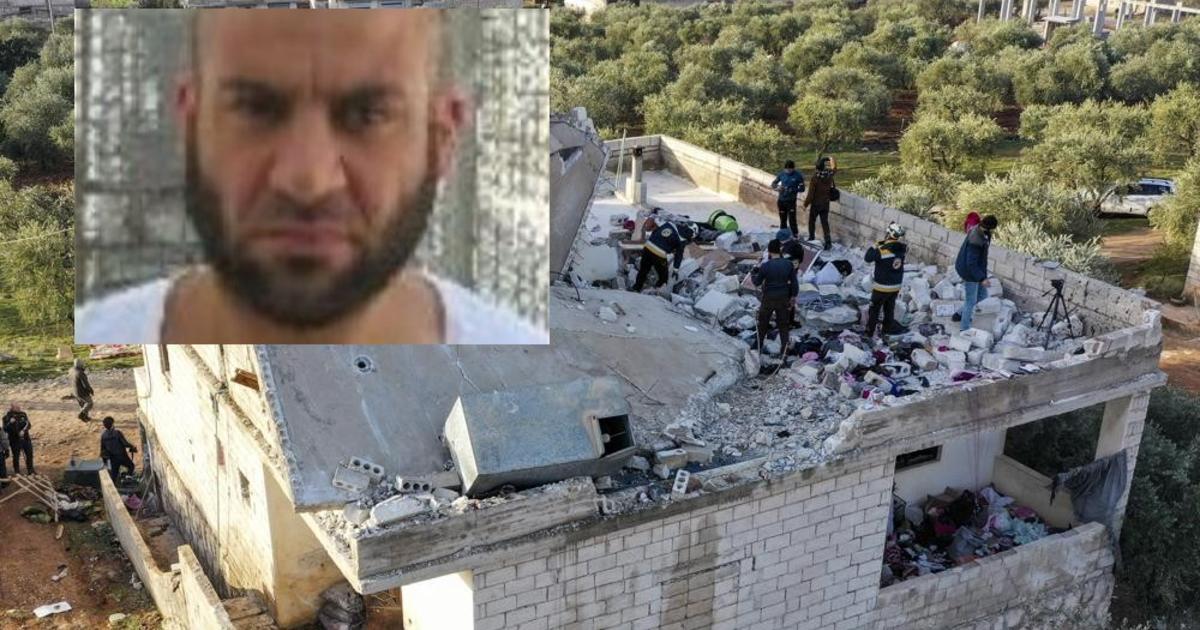America’s allies in Syria accuse Turkey of giving ISIS a “safe zone”
Irbil, Iraq — America’s allies in the Middle East have lauded the Biden administration for the brazen U.S. special forces raid in northern Syria last week that saw the top leader of ISIS “taken off the battlefield.” But as leaders and experts warn that ISIS is trying to rebuild, and that decapitating the group won’t cripple it for long, there are mounting allegations that a vital U.S. ally in the region is actually giving ISIS room to breathe.
The Syrian Democratic Forces (SDF), the umbrella rebel group of mainly Kurdish fighters that the U.S. relied on for years to lead the ground war against ISIS in Syria, says Turkey — a NATO member on the edge of the alliance’s geographic border with the Mideast — is allowing ISIS a “safe zone” in northern Syria.
The death of the second top ISIS commander in three years in a home very close to Turkey’s border is presenting some awkward questions for the U.S. and its NATO partners.
Abu Ibrahim al-Hashimi al-Qurayshi blew up himself and members of his family as elite U.S. forces moved in last week, the Pentagon said. He was holed up in a house in Atmeh, a Syrian town less than two miles from the Turkish border. It was a remarkably similar operation, with an identical outcome, to the 2019 U.S. raid that left ISIS’ previous leader dead. Abu Bakr al-Baghdadi was killed in a house southwest of Atmeh, less than three miles from Turkish soil.
“Many Daesh [ISIS] and al Qaeda leaders are still alive, protected by Turkey in occupied areas of northeast and northwest Syria,” the head of the SDF’s media and information office, Farhad Shami, told CBS News the day after al-Qurayshi was killed. “He was protected between three Turkish military bases. … Is there any doubt that Turkey turned areas of northern Syria into a safe zone for Daesh [ISIS] leaders?”
Turkey’s Defense Ministry did not reply to a CBS News request for comment on the allegations, but a security source in the country dismissed the SDF claim as “utterly ridiculous,” saying Turkey has been targeted by ISIS many times in the past and that Turkish forces continue to fight against the group.
ISIS has been blamed for several major attacks inside Turkey, including a devastating New Year’s Eve siege on a popular Istanbul nightclub in 2017 that the group itself claimed responsibility for. That attack alone left 39 people dead and Turkish officials say, in total, ISIS has killed 315 civilians in the country.
Diplomatic sources in Turkey, who would also speak to CBS News only on the condition of anonymity, were equally dismissive of what they labelled “slander” from the SDF. They reiterated the Turkish government’s stance that the rebel force is itself a terrorist organization “under the control of” Turkish separatists.
There has never been any love lost between Syria’s SDF rebels and Turkey.
Turkish leaders have long considered the SDF terrorists — an extension of armed Kurdish separatist groups based in southern Turkey. The chaotic, decade-old civil war in Syria has given the Turks cover to launch military operations across their border, going after Kurdish fighters on Syrian soil. It has made the NATO member a sometimes difficult ally for the U.S., given the heavy American reliance on the SDF.
While the U.S. now has only a few hundred troops on the ground in Syria, still working with the SDF, Turkey maintains a significant military presence in the country’s north.
A report on last week’s U.S. raid compiled by independent researcher and journalist Alexander McKeever says Turkish forces are based at multiple locations within just several miles of the house in which al-Qurayshi died.
“How were two of the most wanted men in the world found living just outside Turkey?” wrote McKeever. He said the recently deceased ISIS leader chose a house to hide in that was less than two miles from a security checkpoint inside Turkey, and about three miles “from the closest Turkish military base inside Syria.”
“It’s quite apparent that combating the Islamic State is low on Turkish priorities in Syria,” he concluded.
The U.S. State Department and the Pentagon declined to comment on the SDF’s allegations, referring CBS News to the rebel group and Turkey to discuss the matter.
Iraqi officials, including Prime Minister Mustafa Al-Kadhimi, welcomed the death of the ISIS leader and said the country had provided intelligence to the U.S. that revealed al-Qurayshi’s whereabouts.
But Iraqi officials are skeptical that the commander’s death will impede ISIS for long.
Recent months have seen a noted uptick in the terror group’s operations on both sides of the Iraq-Syria border, including the bloody attack on an SDF-run prison in the northern Syrian city of Hasakah. It was ISIS’ boldest move in years, leaving 121 SDF fighters, prison staff and civilians dead, and some ISIS prisoners managed to escape.
In a report published Wednesday, United Nations Secretary-General Antonio Guterres said it was estimated that ISIS still has between 6,000 and 10,000 fighters on both sides the Iraq-Syria border.
“ISIS continues to operate as an entrenched rural insurgency in Iraq and the Syrian Arab Republic, exploiting the porous border between the two countries, while maintaining operations in areas of low security pressure,” the report said.
“ISIS is a very ideological organization, and killing the leader might affect ISIS for a short time, until they nominate a new leader, but it will not have long term impact,” Iraqi security expert Fadhil Abu Ragheef told CBS News.
The SDF did welcome the operation to take out ISIS’ most recent leader. Commander Mazloum Abdi thanked the U.S. for eliminating al-Qurayshi and for its “continuing support.”
Shami, the SDF media officer, told CBS News that his group had played an important role in the operation, and that U.S. special forces launched their raid from a base in SDF territory.
He said the ISIS leader’s death was undeniably a good thing but warned that if the terror group continues to benefit from a “safe zone” in Syria, it will be very difficult to ensure stability in the region.
CBS News’ Camilla Schick and Eleanor Watson in Washington, and Pamela Falk at U.N. headquarters contributed to this report.



